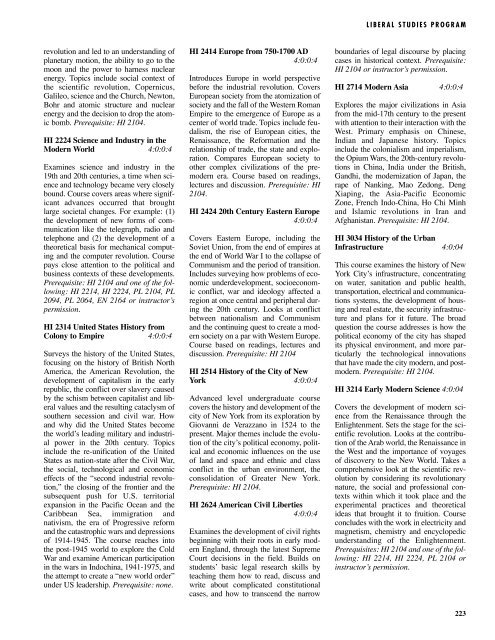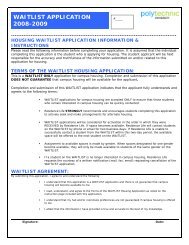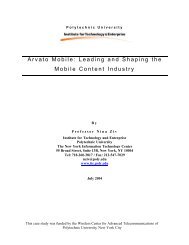POLYTECHNIC UNIVERSITY 2005-2007
POLYTECHNIC UNIVERSITY 2005-2007
POLYTECHNIC UNIVERSITY 2005-2007
Create successful ePaper yourself
Turn your PDF publications into a flip-book with our unique Google optimized e-Paper software.
LIBERAL STUDIES PROGRAM<br />
revolution and led to an understanding of<br />
planetary motion, the ability to go to the<br />
moon and the power to harness nuclear<br />
energy. Topics include social context of<br />
the scientific revolution, Copernicus,<br />
Galileo, science and the Church, Newton,<br />
Bohr and atomic structure and nuclear<br />
energy and the decision to drop the atomic<br />
bomb. Prerequisite: HI 2104.<br />
HI 2224 Science and Industry in the<br />
Modern World 4:0:0:4<br />
Examines science and industry in the<br />
19th and 20th centuries, a time when science<br />
and technology became very closely<br />
bound. Course covers areas where significant<br />
advances occurred that brought<br />
large societal changes. For example: (1)<br />
the development of new forms of communication<br />
like the telegraph, radio and<br />
telephone and (2) the development of a<br />
theoretical basis for mechanical computing<br />
and the computer revolution. Course<br />
pays close attention to the political and<br />
business contexts of these developments.<br />
Prerequisite: HI 2104 and one of the following:<br />
HI 2214, HI 2224, PL 2104, PL<br />
2094, PL 2064, EN 2164 or instructor’s<br />
permission.<br />
HI 2314 United States History from<br />
Colony to Empire 4:0:0:4<br />
Surveys the history of the United States,<br />
focusing on the history of British North<br />
America, the American Revolution, the<br />
development of capitalism in the early<br />
republic, the conflict over slavery caused<br />
by the schism between capitalist and liberal<br />
values and the resulting cataclysm of<br />
southern secession and civil war. How<br />
and why did the United States become<br />
the world’s leading military and industrial<br />
power in the 20th century. Topics<br />
include the re-unification of the United<br />
States as nation-state after the Civil War,<br />
the social, technological and economic<br />
effects of the “second industrial revolution,”<br />
the closing of the frontier and the<br />
subsequent push for U.S. territorial<br />
expansion in the Pacific Ocean and the<br />
Caribbean Sea, immigration and<br />
nativism, the era of Progressive reform<br />
and the catastrophic wars and depressions<br />
of 1914-1945. The course reaches into<br />
the post-1945 world to explore the Cold<br />
War and examine American participation<br />
in the wars in Indochina, 1941-1975, and<br />
the attempt to create a “new world order”<br />
under US leadership. Prerequisite: none.<br />
HI 2414 Europe from 750-1700 AD<br />
4:0:0:4<br />
Introduces Europe in world perspective<br />
before the industrial revolution. Covers<br />
European society from the atomization of<br />
society and the fall of the Western Roman<br />
Empire to the emergence of Europe as a<br />
center of world trade. Topics include feudalism,<br />
the rise of European cities, the<br />
Renaissance, the Reformation and the<br />
relationship of trade, the state and exploration.<br />
Compares European society to<br />
other complex civilizations of the premodern<br />
era. Course based on readings,<br />
lectures and discussion. Prerequisite: HI<br />
2104.<br />
HI 2424 20th Century Eastern Europe<br />
4:0:0:4<br />
Covers Eastern Europe, including the<br />
Soviet Union, from the end of empires at<br />
the end of World War I to the collapse of<br />
Communism and the period of transition.<br />
Includes surveying how problems of economic<br />
underdevelopment, socioeconomic<br />
conflict, war and ideology affected a<br />
region at once central and peripheral during<br />
the 20th century. Looks at conflict<br />
between nationalism and Communism<br />
and the continuing quest to create a modern<br />
society on a par with Western Europe.<br />
Course based on readings, lectures and<br />
discussion. Prerequisite: HI 2104<br />
HI 2514 History of the City of New<br />
York 4:0:0:4<br />
Advanced level undergraduate course<br />
covers the history and development of the<br />
city of New York from its exploration by<br />
Giovanni de Verazzano in 1524 to the<br />
present. Major themes include the evolution<br />
of the city’s political economy, political<br />
and economic influences on the use<br />
of land and space and ethnic and class<br />
conflict in the urban environment, the<br />
consolidation of Greater New York.<br />
Prerequisite: HI 2104.<br />
HI 2624 American Civil Liberties<br />
4:0:0:4<br />
Examines the development of civil rights<br />
beginning with their roots in early modern<br />
England, through the latest Supreme<br />
Court decisions in the field. Builds on<br />
students’ basic legal research skills by<br />
teaching them how to read, discuss and<br />
write about complicated constitutional<br />
cases, and how to transcend the narrow<br />
boundaries of legal discourse by placing<br />
cases in historical context. Prerequisite:<br />
HI 2104 or instructor’s permission.<br />
HI 2714 Modern Asia 4:0:0:4<br />
Explores the major civilizations in Asia<br />
from the mid-17th century to the present<br />
with attention to their interaction with the<br />
West. Primary emphasis on Chinese,<br />
Indian and Japanese history. Topics<br />
include the colonialism and imperialism,<br />
the Opium Wars, the 20th-century revolutions<br />
in China, India under the British,<br />
Gandhi, the modernization of Japan, the<br />
rape of Nanking, Mao Zedong, Deng<br />
Xiaping, the Asia-Pacific Economic<br />
Zone, French Indo-China, Ho Chi Minh<br />
and Islamic revolutions in Iran and<br />
Afghanistan. Prerequisite: HI 2104.<br />
HI 3034 History of the Urban<br />
Infrastructure 4:0:04<br />
This course examines the history of New<br />
York City’s infrastructure, concentrating<br />
on water, sanitation and public health,<br />
transportation, electrical and communications<br />
systems, the development of housing<br />
and real estate, the security infrastructure<br />
and plans for it future. The broad<br />
question the course addresses is how the<br />
political economy of the city has shaped<br />
its physical environment, and more particularly<br />
the technological innovations<br />
that have made the city modern, and postmodern.<br />
Prerequisite: HI 2104.<br />
HI 3214 Early Modern Science 4:0:04<br />
Covers the development of modern science<br />
from the Renaissance through the<br />
Enlightenment. Sets the stage for the scientific<br />
revolution. Looks at the contribution<br />
of the Arab world, the Renaissance in<br />
the West and the importance of voyages<br />
of discovery to the New World. Takes a<br />
comprehensive look at the scientific revolution<br />
by considering its revolutionary<br />
nature, the social and professional contexts<br />
within which it took place and the<br />
experimental practices and theoretical<br />
ideas that brought it to fruition. Course<br />
concludes with the work in electricity and<br />
magnetism, chemistry and encyclopedic<br />
understanding of the Enlightenment.<br />
Prerequisites: HI 2104 and one of the following:<br />
HI 2214, HI 2224, PL 2104 or<br />
instructor’s permission.<br />
223




